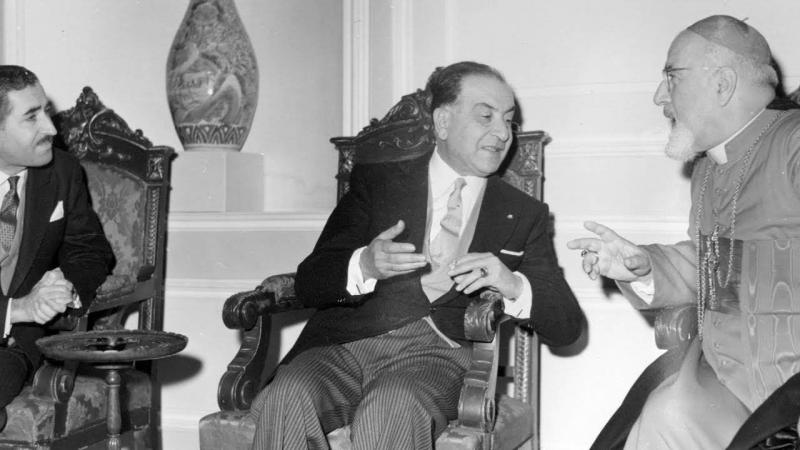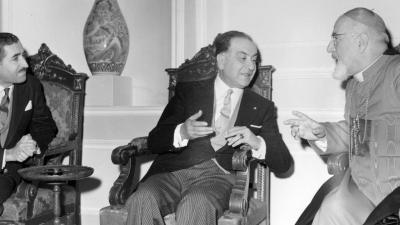Since April 25th, the Lebanese have been recalling President Fouad Chehab on social media, marking fifty years since his passing in 1973 at the age of 71 due to a heart attack.
On this anniversary, many politicians and officials hurried to express their regret over the seven-month vacancy in the presidency, alongside the collapse of the institutions built by Chehab, one after another, while the current period is marked by petty squabbling, populism, and neglect of responsibility. The question arises: if President Chehab were alive today, what would he do upon seeing that the country he tried to build brick by brick, based on constitutional and legal principles, has fallen to the lowest depths of hell, on the verge of fragmentation and total collapse? This question was posed to former minister Edmond Rizk, who knew Chehab closely and met with him multiple times, gaining insight into his civilizational and national perspective on governance. He said, "Had President Chehab been alive, he would have conducted a comprehensive rescue operation for the nation, its people, and its institutions. If he or others who are qualified existed, they would have carried out their responsibilities competently. What is needed is a specific approach to handling responsibility, which is currently lacking due to the incompetence of those in power from top to bottom. President Chehab possessed the qualities of a dedicated statesman. 'Chehabism' represents a school of political realism and modern administration. He excelled in personal performance, humility, work ethic, and good conduct. He was principled in power, far from nepotism and patronage, and operated from common sense."
### The President and the Taif Agreement
Many politicians and constitutional experts believe that several powers were taken away from the President after the Taif Agreement, which established a new governance formula among the Lebanese. The system shifted from one in which the constitution granted the president special powers to what could be termed a confessional consensus system, where executive authority was vested in the Council of Ministers as a whole.
Others, including former MP Boutros Harb, argue that what matters is not the powers but the practice. He told "Wridehna" that the current circumstances are completely different from President Chehab's era, as are the mindsets. While Chehab had the required ethics and political culture, he asserts that "if someone with those qualities reached the presidency today, especially under the influence of a quasi-state amidst the prevalence of illegal arms, it would not solve the Lebanese dilemma." Harb believes that the solution lies in changing the mindset of political leaders, "dismantling the armed militias, and restricting arms to the state." Only then could someone who possesses Chehab's traits effect change; otherwise, if things remain as they are, "it is virtually impossible to implement any reform."
Thus, while constitutionally, the president enjoyed broader powers before the Taif Agreement, in practice, he exercised powers as they are today. Therefore, "the issues are less about powers and more about the mentality of rulers who divide the country into small statelets, preventing the establishment of a strong state or Greater Lebanon," according to Harb, who aligns with Rizk’s view, who participated in the Taif Agreement. Rizk believes that the Taif document amended the principles of managing executive authority, transferring certain powers from the president to the Council of Ministers collectively, moving from an individual to a complete institution. Hence, "it did not take powers from one individual to give to another. The document abolished powers that were never exercised by any president in Lebanon, from independence until Taif, because they pertain to the constitutions of presidential systems rather than parliamentary ones."
As everyone senses the danger to the future of the country, officials continue to squabble over the name of the figure who will open the gates of Baabda Palace. This prompts reflection on a significant moment in Lebanese history and President Chehab's life: September 22, 1964, when he left the presidency and withdrew after recognizing the danger looming over the country, leading it towards collapse and disintegration. When summoned to continue in office, Chehab refused and later declined to return because he believed it was inappropriate to continue with the system's structure as it was without necessary reforms.
Many believe that since that period, signs of fragmentation and decay have begun to emerge, now manifesting in their worst form, attributed by Rizk to "the presence of unqualified leaders. A visionary democratic leader is one who fulfills responsibilities with sincerity and competency. Anyone who understands the seriousness of the situation and the failures of the officials is in a state of suffering. There is considerable negligence and even greater failure. In the absence of accountability and oversight, sound performance based on rationality disappears."
### A President with Knowledge and Will
Amid the presidential crisis and fifty years after the passing of the man who left a mark on building a state of institutions and law, achieving social justice, growth, and development, he remains the greatest presence, filling the vacancy with the qualities and virtues spoken of by the Lebanese on social media. They hope the next president will emulate President Chehab— a statesman who seeks to apply the constitution, refers to the law in case of dispute, loves his country, prioritizes national interest, is a reformer, rebuilds what has been destroyed, and protects Lebanon’s sovereignty and unity.
One must ask: Do we need a president of Chehab's caliber to pull the country from the depths of hell? What are the presidential priorities? Rizk responds: "We need someone worthy of shouldering responsibilities. Chehab's model was exceptional, but it is not essential for the next president to be an exact replica of him; what matters is that he is a qualified individual. Despite Chehab's competency and principled conduct, he is not a unique mold. Today, we want someone who knows and wants to, because those who know but do not want are useless, and those who want but do not know are equally ineffective. Knowledge and will are fundamental, as are integrity, humanity, and high morals that free authority from notions of status and patronage. President Chehab was a safety valve during his presidency, and the system should always produce qualified officials to carry the trust."
The future president will have many priorities, but revitalizing the role of institutions remains the essential pathway for reform. Any president must possess logic, understanding, and the ability to make the right decisions, but if he lacks a capable and good team that works for the benefit of the country rather than personal gain, he cannot achieve any success. He needs experts, specialists, assistants, and advisors to provide him with the necessary options so he can choose the best. Most importantly, there must be harmony between the president and the prime minister, as without this, nothing can be accomplished, since the prime minister could obstruct the president's role as head of the council. This harmony is essential between the two leaders according to Harb.
Regarding Lebanon's sovereignty and territorial integrity, which everyone demands while the country's situation indicates that it is neither free, independent, nor sovereign, amid threats of division and federalism, it brings to mind the event of President Chehab's meeting with President Gamal Abdel Nasser in a tent that straddled Lebanese and Syrian territory, respecting and appreciating the national sovereignty of both countries. Nasser sat on the Syrian side, while Chehab sat on the Lebanese side, agreeing on a comprehensive strategy, politically, security-wise, and in media terms, that included respecting Lebanon's sovereignty by the leading Arab pole while ensuring that Lebanon's foreign policy would not conflict with that of the United Arab Republic, but without forcing Lebanon to abandon its friendships with the outside world. This incident encourages comparison between the past and the present, provoking the question: Are not the practices, interventions, and bindings that have become clear today a violation of the principle of sovereignty? What remains of the rule of law and institutions? Are we truly in a country of missed opportunities?
All we see today in this context is "the result of bequeathing unqualified individuals to power," according to Rizk, who remarked: "We are undoubtedly living in a phase of lost sovereignty that necessitates a singular authoritative reference according to the constitution in legislation, execution, and the presidency." Thus, we must "first restore the concept of service," as President Chehab started from a fundamental conviction driven by civilized considerations that institutions must be sound to ensure public service. As Rizk narrates, he continues: "Unfortunately, institutions today are in a state of complete paralysis and continuous collapse due to competition and jockeying for gains and positions, as the notion of authority has become synonymous with status and upper-tier practices."
After all these years, and with the country on the brink of total collapse, is there any hope for rebuilding the state and its institutions, led by statesmen like Chehab and others who played significant roles in Lebanese history? Their works and stances testify to them, making them role models long after their departure because they "operated from the principle that authority is a responsibility, and its dignity is contingent upon performance?" Today's authority is associated with status, and dignity is compromised. Therefore, we feel "that President Chehab remains the greatest presence amid the ongoing presidential vacancy since the end of President Elias Sarkis's term, for filling the seat is not about individuals but about performing the roles and fulfilling the duties," according to former minister and MP Edmond Rizk.




